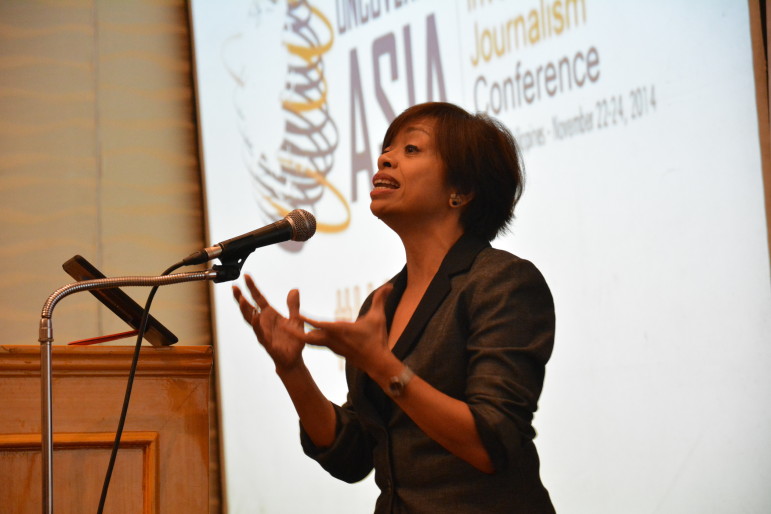
Karen Chang
Investigative journalist Sheila Coronel gives the keynote speech at the first Asian Investigative Journalism Conference.
In a powerful keynote speech, one of Asia’s most prominent investigative reporters told journalists that “speaking truth to power is an Asian value.”
Sheila Coronel, founder of the Philippine Center for Investigative Journalism and director of Toni Stabile Center for Investigative Journalism at Columbia University, addressed a room of more than 300 journalists, editors and media-savvy investigators from 32 countries.
Since 1989 investigative reporting centers have blossomed around the region. The Investigative Centre for Investigative Journalism in Nepal, the Korea Center for Investigative Journalism, the Center for Investigative Reporting in Pakistan, the Thailand Information Center For Civil Rights and Investigative Journalism, and India’s Centre of Investigative Journalism, among others, have established themselves as leaders in the field.
“Once journalists and citizens have had a taste of independence and freedom, it is hard to go back to the dark ages,” Coronel said. This is the case of Asia—a region that has undergone immense change in the past 20 years as a result of toppled dictatorships and the opening of markets—and to show for it are numerous muckraking achievements in the region.
“Before 1980s, there was hardly any negative news in China’s media…but in the past 20 years, newspapers and magazines in China have been raging a guerrilla war against government censors,” Coronel said.
An ample array of game-changing journalistic endeavors were highlighted. In a 2011 exposé by Southern Weekend, Guangdong-based journalists shed light on organic farms that produced vegetables and fruits for China’s rich and powerful—while others in the country were left to eat contaminated food.
In Pakistan, a 2011 investigation by the Center for Invesitgative Reporting revealed that high-ranking officials weren’t paying taxes. This caused nation-wide outrage that ultimately led to a change in policy: the country is now the 4th in the world to make tax records public.
In Indonesia, Tempo has braved investigative journalism, “taking on corruption, politicians, fat-cat businessmen, military and the police—the most powerful and deeply entrenched institutions in Indonesia,” Coronel said.
“By forcing officials into the glare of public scrutiny, we are saying their crimes cannot be kept secret,” she added, while sharing her own efforts to document and expose government-owned luxury mansions.
